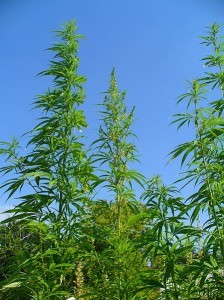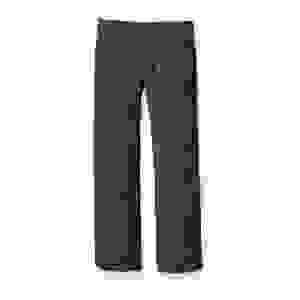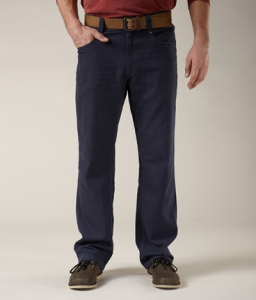
For the vast majority of reasonable humans found anywhere on the planet, jeans are the greatest invention in the medium of apparel in the history of human civilization. They look good. They feel good. They are suitable for (nearly) any social occasion. The good ones last forever. And they’re popular enough that you can find them in specifications that will adhere to your body in exquisite fashion. Pun intended.
On the downside, they’re hot, heavy, and take forever to dry. The heat is only a problem in the summer, of course, and drying time is of no concern to people with laundry facilities. But why are we still wearing hot and heavy denim jeans when a million different fabrics brag about spectacular temperature regulation and moisture management?
Cotton denim jean alternatives
The outdoor industry has been blathering on and on about performance fabrics for decades now, and with good reason. Cotton is a horrific fabric, particularly in terms of environmental sustainability, but has a number of comfort disadvantages as well, particularly when it comes to extreme weather conditions. They’ve come up with a million different solutions that work a million times better, yet somehow no one bothers using them in a pair of jeans.

I’ve complained rather ferociously about the inexcusable crime against humanity that is the world’s lack of travel jeans, and every year I look for alternatives with practically nothing in sight. It’s a Sisyphean hamster wheel on which I run continuously, all the while thinking in the back of my head that I could just buy the damn fabric and learn to sew for myself in the amount of time it’ll take for the gargantuan sloth that is the clothing industry to embrace new technologies and implement them on a readily-available scale.
So I’d like to direct today’s rage at one particular solution that would be absolutely spectacular, but which almost nobody bothers exploiting:
Hemp jeans
Turns out the hippies were right. Hemp is an absolutely spectacular fabric for jeans, and a variety of other things, and we don’t bother using it because we’re all stupid.
Hemp promises a number of advantages, both in terms of performance and sustainability, which will make you wonder why we’ve been using cotton this whole time.
- Durability. Hemp was used to make ropes for ships, because it was incredibly strong. It’s quadruple the strength of cotton, so it’ll outlast your current jeans by decades.
- Moisture management. Hemp feels a lot like linen, transporting moisture away from the skin and avoiding that sticky, clingy feeling on hot days.
- Temperature regulation. Hemp will paradoxically keep you warmer in winter, and cooler in summer.
- Natural odor resistance. You know how jeans are famous for never being washed? Well, hemp will let you get away with this even more.
- Soft and comfy. It doesn’t have that tough texture like cotton denim. It’s kind of silky.
On top of all that, it’s important to point out the myriad advantages of hemp in terms of environmental sustainability. If you haven’t heard, cotton is a horrific fabric for the environment. Hemp is not only more comfy, but it’s also better for everyone involved:
- Land use: Cotton needs twice as much land as hemp.
- Water use: Cotton needs about 4 times as much water as hemp.
- Pesticides: Cotton production tends to involve a ridiculous amount of pesticides, and those chemicals find their way into the water supply of developing countries, where the cotton is grown. Hemp doesn’t need any pesticides at all. That’s why they call it weed.
- Crop rotation: Cotton damages the land, whereas hemp enriches it. Rotating crops with hemp actually increases the yield of the accompanying crop.
As you can see, this is a big deal. Not many people think about cotton as environmentally destructive, but it’s practically a plague. And while it’s true that organic cotton circumvents a number of these problems (and can even be more efficient in terms of energy use during production than hemp), cotton still needs plenty of land and water to grow. Hemp doesn’t.
And besides, why bother with organic cotton if hemp has all those performance advantages anyway? Plus, in addition to the fiber, you get the seeds, which are plenty useful too. It’s not just win win. It’s win win win win win. Etc, etc.
Why I want hemp jeans for travel
So part of the reason I keep digging around for suitable alternatives to a standard pair of Levi’s is that I love to travel. And specifically, I love to travel light. I don’t want to bring a giant suitcase that needs its own rickshaw. I want a bare minimum of gear that’ll look good and feel good 100% of the time.
For a variety of reasons, hemp jeans would be great for travel. They’d offer better moisture management, keeping you cooler in hot weather; the hollow fiber would keep you warmer in winter; the greater durability would keep it looking good no matter how many concrete floors you have to sleep on; and the odor resistance would trick people into thinking I’m a respectable person.

Hemp jeans would be useful in all sorts of ways, particularly when it comes to some of the weather extremes (and laundry laziness) that show up on an extended trip.
As for any downsides? Well, I will say that hemp feels quite different from cotton jeans. They drape like linen, with a much softer and more pliable feel. This can be good or bad, since some people like how a pair of jeans feels like body armor, though some people prefer the softer feel anyway.
I’m also a big fan of quick-drying clothes, so combining hemp with polyester or Tencel might make sink washing and hang drying a whole lot easier, plus it could potentially feel more like a normal pair of jeans. Wrinkling (or rather, creasing) is also a problem with pure hemp, so a bit of polyester would go a long way.
Unfortunately, I don’t really have the choice, since practically none of these options exist anyway. Yay.
Where can I buy hemp jeans?!?!
Sadly, options are slim to none. A few stores do actually exist, but they have constant stock issues, their websites look like they were designed in 1992, the promo photos look like they’re about 30 pixels tall, and you can barely see what you’re looking at.

Plus, there’s the obvious problem of having so few choices that if it fits awkwardly, you’re out of luck. And since you have to order all of them online, you’ll probably go through a few options that don’t work out and get stuck with return shipping costs that will be incredibly annoying.
As you can probably tell, I’m speaking from personal experience.
So no, these aren’t “great” options, but they are some of the only options that exist:
- Dash Hemp. One of the few manufacturers of 100% hemp jeans anywhere to be found. They only seem to make one or two types of jeans per year, and they’re constantly out of most of them anyway.
- Rawganique. Limited options, high prices, small photos.
- Hempest. Lots of options, but constant stock issues, and awful photography.
As you can see, it might have as much to do with inadequate business practices as anything else. There’s just no way customers could come away consistently satisfied with the shopping experience at any of those places. Step it up, guys.
Two new ones (with great photos!):

So I’ve seen a couple new options come into existence lately, by some outdoorsy/travel-oriented companies whose gear I enjoy.
And you can actually find them in your size, and you can actually see the damn pictures! Argh!
Anyway:
- The Patagonia Hemp Overstone Pants, which primarily use hemp, blended with a smaller amount of polyester, for faster drying time and a little wrinkle resistance, and come in khaki or grey. They feel quite soft, and they look pretty good. The gusseted crotch and articulated knees make these a good outdoorsy pant, and it was actually designed for their rock climber fans.
- The Royal Robbins Green Jean, named for its high percentage of recycled and organic materials, features approximately equal proportions of hemp, cotton, and polyester, giving it some of the properties of each, and…drum roll…they actually come in blue! They also come in grey and khaki, but at least someone out there is making use of blue. Royal Robbins sent me a free sample of these to try out, so I’ll come back here with long-term comments, but they look good and feel nice and soft. They’re made in quite a relaxed fit, so you’ll probably want to get a smaller size than normal.
Both of these use a weave that is different from traditional denim (I think they use what is called a “canvas weave,” though I’m not sure), and the linen-like texture of the hemp gives it a somewhat different appearance than ordinary jeans, but I think they work just fine as a somewhat-out-of-the-ordinary denim alternative.
Someday I shall have my hemp jeans
(Update: The following concluding statements were written before a couple of the above options existed, so I’m no longer quite as upset as before. But I’m leaving it just the way it is, because this problem should have been solved a century ago!)
As you can tell, this has been a thorn in my side for quite some time. Every year, I look for a pair of jeans that’ll work for ultralight, weather-condition-varying travel, and every year, I come away disappointed. With humanity.
To be honest, I don’t even know how good they would be. I’ve tried some before, but they didn’t fit well enough to keep, and I didn’t want to go through testing them and then return them, and my suggestions on blending with other fabrics are purely speculative, since those options are practically nonexistent. Tencel jeans might be even better. But I have no idea, since they barely exist either.
But someday…I shall have myself a pair of hemp jeans. And…hopefully…if they’re as good as everyone who owns some declares them to be…well, I’ll be slightly less annoyed with the world. Ever so slightly.
One can hope.




You might also try Korra jeans. They do a pair in hemp. Even more excitingly, they can make them to your exact measurements, so no issues getting the proper fit. http://korra.in/
Looks like linen as well, which would also work nicely. They have a lot of similar properties. The prices are pretty good on those, too.
Feast your eyes on this companies hemp denim line of jeans and clothing:
http://hempblue.com/collection.
They just finished their KickStarter campaign, which was a big success, so this company is one to watch in terms of producing the finest in hemp clothing.
I used to own a lovely light pair of hemp pants. They lasted nearly 8 years. I loved them. They draped like linen and they were fine for Australia’s long hot summers. The company was the Margaret River Hempco, in Western Australia. I’ll paste in the link to the Men’s Pants page where they offer a ‘hemp denim jean’ as well as a lighter canvas option. And yes, I’ll be buying myself a new pair of hemp jeans this year. I’m hoping they will include a hemp/tencel mix in their offerings.
http://www.hempco.net.au/shop/Hemp-Clothing/Mens-Clothing/Mens-Pants
http://www.lividjeans.com/product/hempcotton/
Best jeans ive found
http://www.rogueterritory.com/shop/strider-14-oz/
hemp jeans
http://ww.companiondenim.com/
the Joel 08CA
http://www.cianofarmer.com/index.html
and this guy will hand make you a pair for around 100$
just call him and ask about the hemp/cotton jeans, he will customize the size for you too.
Your list of benefits of using hemp as a fabric was informative, specifically the portion about odor resistance. You make a solid argument for the use of this material as a textile.
I got a pair of hemp jeans from Dashhemp but they are not 100% hemp. (55%hemp, 45% organic cotton.) But, they are really comfortable and very reasonably priced. No issues with shrinkage and they look great. I had ordered a pair of 100% hemp jeans from rawaganique but they did not work out very well at all. I followed the care instructions, wash in cold and tumble low, but they shrunk A LOT. So much I could not wear them, and I had to contact the company who were less than helpful. They made “snarky” comments criticizing Americans for a culture where the customer is always right and basically told me too bad that the jeans shrank but I should have understood that can happen with hemp. So, I never really got to wear them until a couple months later, after a surgery that caused some substantial weight loss, got them to fit. Then I noticed that the zipper wouldn’t stay up. When I contacted them about the defective zipper they told me, once again, too bad for me since I had purchased the jeans three months prior and it was too late to return them. So, if you do order from rawganique, just be aware that you will not get any support from them if there are problems with their products. This is really an issue for a company that does its sales online where the customer really does have to take a leap of faith that the vendor will stand by its products. Needless to say, I will never purchase from rawganique again but Dashhemp will get more business from me in the future.
Yeah, that’s pretty lame. I’ve noticed that publicly complaining tends to work out quite well, though. They don’t want to build a reputation for low-quality products, so the more people talk about the problems they experience, the more they’ll address them.
Hi, I bought a pair of hemp denim jeans from Gustin, 42% hemp. Love them but they did shrink in the inseam. I soaked them for an hour, tried them on and then took them to my local seamstress. At that point they were perfect in the length. Several months later I washed them in cold water. They shrank about a half inch in length. Did not ruin them but they are now a tad shorter than I like. I love these jeans and will buy more hemp denim but beware that they shrink.
If you hang them from a coat hanger and spray them down with water in the shower, then let them hang dry, the water weight will stretch them vertically and make them longer again. It works with merino. It might not work quite as well with hemp, but it’s worth a try, and it’s pretty easy to do it overnight and see how well it worked.
This is so interesting! I am not really sure why these jeans, if they offer so many awesome benefits, are so hard to find! Thank you for sharing this information and the ones you have found!
Cool! I love this article. One of my clients is a small, passionate start-up company that is looking for more innovative fabrics to work with. I’ll let the owner know!
We just finished our first pair of adventure/travel/climbing jeans. They are 99% organic cotton, with only 1% spandex. We found an amazing company in India that has this unique type of denim woven to be soft, stretchy, and durable (without any spandex or polyester). Our gear testers have reported back that they dry quickly and keep you warmer than most “normal” jeans.
And if/when we do hemp jeans in the future, can I contact you to do a gear review? Would love your feedback…
Yup. Although I think for outdoorsy things, blending it with synthetic is usually a good idea. It works really well with the cotton, and doesn’t change the look, whereas hemp really changes how it looks and feels. So I really don’t know if it could work as well as I’m imagining, but at least someone should give it a try.